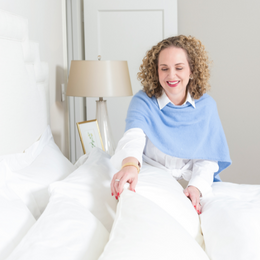Circadian Rhythm \ sər-ˈkā-dē-ən ˈri-t͟həm \: a naturally occurring internal process regulating the sleep-wake cycle, reoccurring in approximately 24-hour cycles.
Every one of us has an internal clock, also known as your circadian rhythm, automatically moving us through periods of wakefulness and sleepiness at regular intervals over a 24-hour day. This is our sleep cycle. Whether we like it or not, whether we are well rested (or not), our sleep cycle automatically makes us feel sleepy or awake at particular times of the day.
While each person’s sleep cycle is different, there are generally three common types:
- Around 30% of us are so-called evening people (often referred to as night owls), feeling sleepy in the early morning but then alert and awake late into the evening, going to sleep well after midnight.
- Another 30% of us are morning people (sometimes called morning larks), feeling awake and active in the morning but becoming sleepy in the evening, and going to sleep around 10 pm or so, far earlier than our friend the night owl.
- Then there are the remaining 40% of us, falling somewhere in between the two. This last group is made up of people who are not true night owls nor morning larks. Instead, finding themselves naturally waking up a little later than a morning lark and falling asleep a little earlier than a night owl.
Sleeping well and getting the right sleep is key to feeling good, looking good, and thinking clearly. Knowing your sleeping cycle will help you get the right sleep that you need to live the best life you can.

For night owls, the natural sleep cycle (or circadian rhythm) looks something like this:
- 9 am to 3 pm: awake and alert
- 3 pm to 4 pm (or so): sleepy and in an afternoon slump
- 4 pm to 11 pm (or later): awake and alert
- Midnight to 1 am: sleepy and going to bed for the night
- 1 am to 9 am: sleeping
For morning larks, the natural sleep cycle (or circadian rhythm) looks something like this:
- 6 am to 1 pm: awake and alert
- 1 pm to 2 pm (or so): sleepy and in a post-lunch daze
- 2 pm to 9 pm: awake and alert
- 9 pm to 10 pm: sleepy and going to bed for the night
- 10 pm to 6 am: sleeping
Each person’s sleep cycle comes hardwired at birth. Because it’s an innate characteristic, as surely as handedness or eye color, it’s difficult to change your sleep cycle in any meaningful way without suffering the consequences that come with not getting the right sleep.
This is where night owls suffer unfairly. In industrialized societies where sleeping is viewed as a waste of time—consider the common maxim “you can sleep when you’re dead”—and the business day often starts between 8:30 and 9:00 am (or earlier), night owls and their relatives are at a distinct disadvantage as compared to morning larks and their like. Both were born with a sleep cycle, but the night owl, biologically programmed to stay up late at night and sleep later in the day, may be labeled as lazy even though she is just following her body’s natural sleep cycle. In response to social pressures and work schedules, the night owl often gets up early in the morning, sleep deprived and unhappy. She may self-medicate with caffeine (and perhaps other things) to make it through the day. Then be up late into the evening kept awake and alert by her body’s own internal sleep cycle.
Insufficient sleep is tied to a host of physical and mental issues from heart disease to depression to Alzheimer’s to immune deficiencies, which the night owl may suffer disproportionately. Don’t fall into this trap if you can help it. Whether you are a night owl or a morning lark (or somewhere in between) be thinking about your own sleep schedule and what you can do to honor it. When we are getting the right sleep for our bodies, we reap the benefits. What to read more? We recommend this article by the National Sleep Foundation. We also love Matthew Walker’s book Why We Sleep: Unlocking the Power of Sleep and Dreams, which you can find here.




